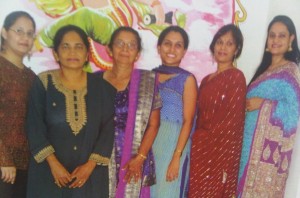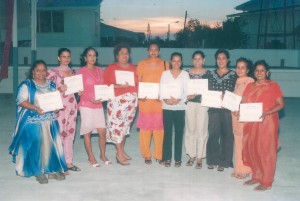The women’s section of the Guyana Hindu Dharmic Sabha, the Mahila Mandalee, is a group of socially conscious Hindu women that works towards addressing a range of issues faced by women and children

Mahila Mandalee (meaning women group or collection of women) was established January 8, 1974. It works in collaboration with the Guyana Hindu Dharmic Sabha in the execution of its programmes and activities.
Among the Mandalee’s main programmes are the children’s literacy programmes, skills training for women, promotion of Indian cookery, Diwali children’s party, and programmes to improve the social, educational, cultural and religious awareness of Hindu women in Guyana.
In an interview with Guyana Times Sunday Magazine, Dr Vindhya Persaud, chairperson of the women’s group, said prior to the Mandalee, many members, including the founding members, were part of the Maha Sabha Girls Club.
However, when the Guyana Hindu Dharmic Sabha was formed in 1974, those persons opened the Mahila Mandalee.
“The founding members included Indranie Persaud, my mother, Chandra Gajraj (Chandra Rambarran at that time), Savitrii Balbahadur and other members.
When the Mandalee was set up it was envisaged, like the Sabha, that there would be branches across the country. There are some branches, but not as many as the Sabha, and what we are doing this year is encouraging all the mandirs to have Mahila Mandalee. Within the mandirs there are groups called Lakshmi Sabha, but we are encouraging them to call it Mahila Mandalee so that we can have a connection which already exists but it’s just a matter of formality,” the chairperson revealed.
Since its inception, the Mandalee has been very much involved in social work and working especially with women to develop and empower them, and also to contribute significantly to children’s education. The Mandalee in the early days focused on teaching women life skills like cookery, and many of them went on to open businesses or used it within their homes. There were cake decorating classes, Indian cookery classes, sewing and embroidery classes, and later on, typewriting classes. Dr Persaud noted that even before the Kendra – where classes are held presently – was built, this group had donated a number of sewing machines to outlying areas and established sewing classes.




